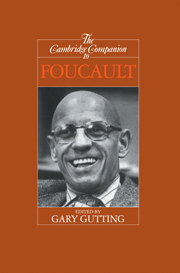Book contents
- Frontmatter
- Introduction: Michel Foucault: A user’s manual
- 1 Foucault’s mapping of history
- 2 Foucault and the history of madness
- 3 The death of man, or exhaustion of the cogito? Translated by Catherine Porter
- 4 Power/Knowledge
- 5 Ethics as ascetics: Foucault, the history of ethics, and ancient thought
- 6 The ethics of Michel Foucault
- 7 “What is enlightenment?”: Kant and Foucault
- 8 Modern and countermodern: Ethos and epoch in Heidegger and Foucault
- 9 Foucault and Habermas on the subject of reason
- 10 “Between tradition and oblivion”: Foucault, the complications of form, the literature of reason, and the aesthetics of existence
- 11 Foucault, feminism, and questions of identity
- 12 Foucault, Michel, 1926–Translated by Catherine Porter
- Bibliography
- Index
Introduction: Michel Foucault: A user’s manual
Published online by Cambridge University Press: 28 May 2012
- Frontmatter
- Introduction: Michel Foucault: A user’s manual
- 1 Foucault’s mapping of history
- 2 Foucault and the history of madness
- 3 The death of man, or exhaustion of the cogito? Translated by Catherine Porter
- 4 Power/Knowledge
- 5 Ethics as ascetics: Foucault, the history of ethics, and ancient thought
- 6 The ethics of Michel Foucault
- 7 “What is enlightenment?”: Kant and Foucault
- 8 Modern and countermodern: Ethos and epoch in Heidegger and Foucault
- 9 Foucault and Habermas on the subject of reason
- 10 “Between tradition and oblivion”: Foucault, the complications of form, the literature of reason, and the aesthetics of existence
- 11 Foucault, feminism, and questions of identity
- 12 Foucault, Michel, 1926–Translated by Catherine Porter
- Bibliography
- Index
Summary
against interpretation
For all Foucault's reservations about modernity and authorship, his writings are typical of a modernist author in their demand for interpretation. Any writing, of course, requires some interpretation as part of our efforts to evaluate, refine, extend, or appreciate its achievement; or to provide special background that readers outside the author's culture or historical period may require. But certain authors – in literature, the twentieth-century modernists are among the best examples – present themselves as so immediately and intrinsically “difficult” as to require special interpretative efforts even for those well equipped to understand them. The Wasteland, Cantos, and Finnegans Wake, for example, require explanation, even for culturally and historically attuned readers, in a way that Paradise Lost, the Essay on Man, and Emma do not. Philosophy, at least since Kant and Hegel, has also provided its share of “intrinsically obscure” writing. Although it may not be easy to formulate the precise difference, it is clear that Wittgenstein, the later Heidegger, and Derrida require a sort of interpretation that Russell, Dewey, and Quine do not.
Foucault's penchant, particularly prior to Discipline and Punish, for the modernist obscure explains much of the demand for interpretations of his work. But the need to interpret Foucault sits ill with his own desire to escape general interpretative categories. More important, as the enterprise of interpretation is usually understood, interpreting Foucault is guaranteed to distort his thought. Interpretation typically means finding a unifying schema through which we can make overall sense of an author's works.
- Type
- Chapter
- Information
- The Cambridge Companion to Foucault , pp. 1 - 27Publisher: Cambridge University PressPrint publication year: 1994
- 16
- Cited by

